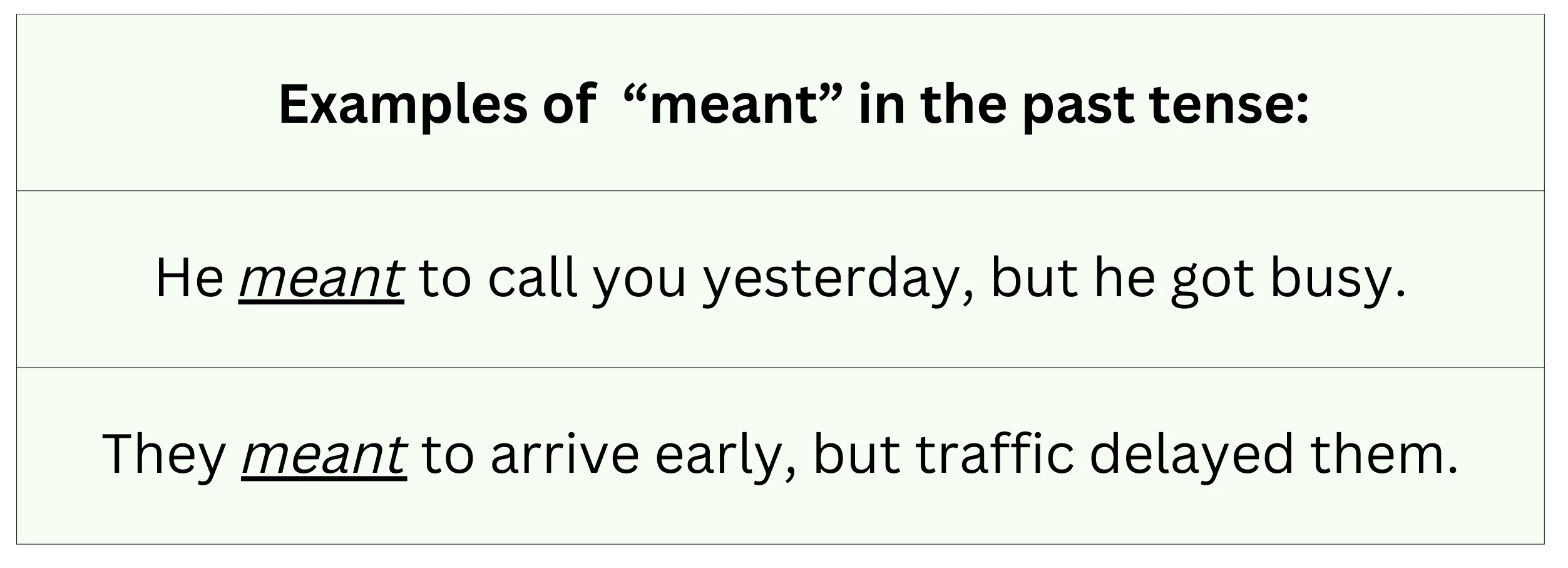
What's the past tense of "mean"?
The irregular verb mean has only one past verb form: meant. Meant is both the simple past tense and past participle form of the verb "mean."
Definition of mean
The irregular verb mean means "to express or represent something such as an idea, thought, or fact." (Cambridge Dictionary) The word mean is also used in a variety of other ways, and can convey different things depending on the context.
- The past tense of mean is meant.
- The past participle of mean is meant.
Mean is also a homophone, and can be an adjective that describes someone as unkind or unpleasant, e.g., "stop being so mean to me!" This article discusses mean as a verb, not as an adjective.
Verb forms of 'mean'
Is "mean" a regular or irregular verb?
Mean is an irregular verb. Irregular verbs do not follow the typical past tense formation rules by adding "-ed." Instead, mean has its own unique past form: meant. Both the simple past tense and past participle use the same form: meant.
When to use "meant"
Simple past: She meant what she said.
Past participle: We had meant to surprise them, but they found out in advance.
The verb mean uses the same form for both simple past tense and present or past perfect), it requires an auxiliary verb like have, has, or had. The simple past doesn't use a helper verb since it's a complete tense, so meant can stand alone in sentences, whereas participles require an auxiliary verb.
Similar irregular verbs
Like mean, the following verbs also have irregular past tense forms that don't follow the standard "-ed" pattern:
Sentence examples: mean, meant, meant
• I mean to finish my work before the deadline.
• She means well, but sometimes her actions may be misinterpreted.
• You should take it as a compliment when I fall asleep in your company – it means I'm relaxed.
• She meant what she said.
• The note he wrote was meant to express his gratitude for their help.
• I didn't mean to hurt your feelings.
• We had meant to surprise them, but they found out in advance.
• The gift she had meant to give her friend was accidentally left at home.
• The project's success had always been meant to showcase their team's capabilities.
Synonyms & nearby words
Synonyms of mean
Common phrases with "mean"
Origin of mean
“Intend, have in mind;” Middle English mēnen, from Old English mænan “intend (to do something), plan; indicate (a certain object) or convey (a certain sense) when using a word,” from Proto-West Germanic *menjojanan
Worksheet: Mean, verb conjugations
I didn’t understand what she ______ by that comment.
Success often ______ hard work and dedication.
What is the ______ of this passage?
He had ______ to call you yesterday, but he forgot.
I don’t ______ to be rude, but that’s not correct.
FAQs
What is past tense of mean?
+
What is past participle of mean?
+
Is ‘mean’ regular or irregular verb?
+
When do you use ‘meant’ simple past?
+
When do you use ‘meant’ past participle?
+
Advertisement








.webp&w=3840&q=75&dpl=dpl_13tcGbrn5BXPQFsQmuQWqib9Y3DN)